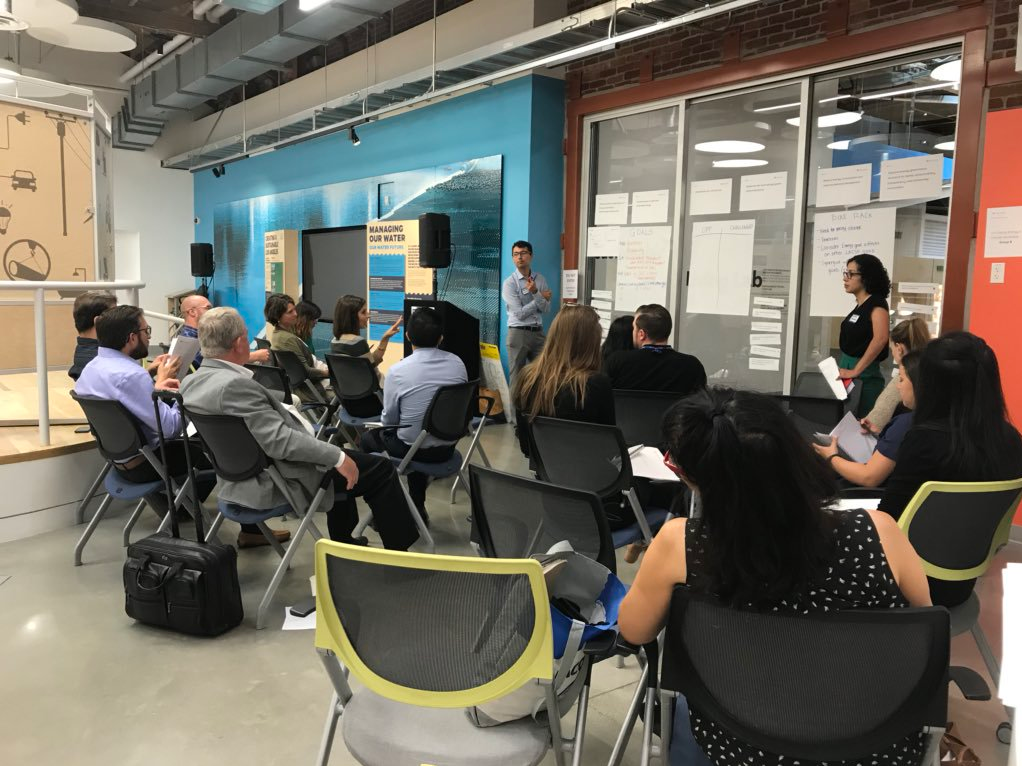UCLA convened public and private sector leaders across Los Angeles County to provide input on the County’s energy system and regional climate change impacts.

The “Energy & Climate” workshop, held on July 31st, 2018 at the Los Angeles Cleantech Incubator, attracted attendees from public agencies, businesses (including utility companies) and members of the Our County Stakeholder Engagement Team.
The L.A. County Chief Sustainability Office began the workshop by providing an overview of the Our County plan development process. UCLA followed with a presentation covering key background information, data, and regional findings related to energy production, storage, distribution, and management. This presentation included a focus on greenhouse gas emissions, climate change data and impacts, and policymaking around L.A. County. The stakeholders in the room also received an accompanying briefing document that provided greater detail.
After the group presentations, workshop participants met in breakout groups to provide feedback on general Energy and Climate goals that were included in the briefing and framed the discussion. The second breakout session featured a series of prompts evoking cross-cutting sustainability themes. The final breakout session consisted of each attendee from the public sector pairing off with an attendee from the private sector. The public-private pair developed a concept for an Energy and Climate-focused public-private partnership opportunity relating to the prompt.
Key Takeaways
- Participants prioritized the need to decarbonize fuel sources as critically important. Though many shared that achieving it would also be a significant challenge, participants agreed that decarbonizing fuel sources and end uses is critical to achieving nearly all Energy and Climate-related sustainability goals. Participants particularly noted decarbonization’s positive impacts on health and workforce and economy.
- Participants want to see L.A. County use its influence to increase workforce development opportunities in the energy sector by corralling industry participation wherever possible. Stakeholders expressed their interests in increasing access to green job training, partnerships with educational institutions, and succession planning for an aging workforce.
- The needs to incentivize sustainable, resilient infrastructure and retrofit existing buildings were mentioned in every breakout group. Many felt this effort should start with ensuring all of L.A. County’s own facilities are zero emissions. Experts focused on the need to strategically identify funding sources for this, and to ensure costs are not passed down to those who are already financially disadvantaged.
- Public and private sector stakeholders agreed on the need for L.A. County to take leadership on yielding improved regional and statewide coordination. Participants stated that the multi-jurisdictional nature of these problems makes coordination with regional, state, and interstate bodies essential. Hopes were shared that L.A. County can identify areas where sustainability plan goals align with those of other regulatory and funding agencies.
- Several conversations led to discussion around the importance of identifying key champions to promote and support the ‘Our County’ plan. Some shared the City of Los Angeles’s Sustainable City pLAn as an example, which has a public face in Mayor Garcetti. Although the ‘Our County’ plan might have the support of the Board of Supervisors, they will need to identify ways to amplify their voice and recruit public-facing champions to speak for the plan. Several participants noted their appreciation regarding this process and its transparency and inclusivity relative to other sustainability plan efforts in the region.
Comments on the key recommendations can be directed to sustainability@lacounty.gov.
Read more in the Energy and Climate Public Private Workshop Summary
Download the Energy and Climate Public Private Workshop Presentation
Download the Our County Energy and Climate Briefing
